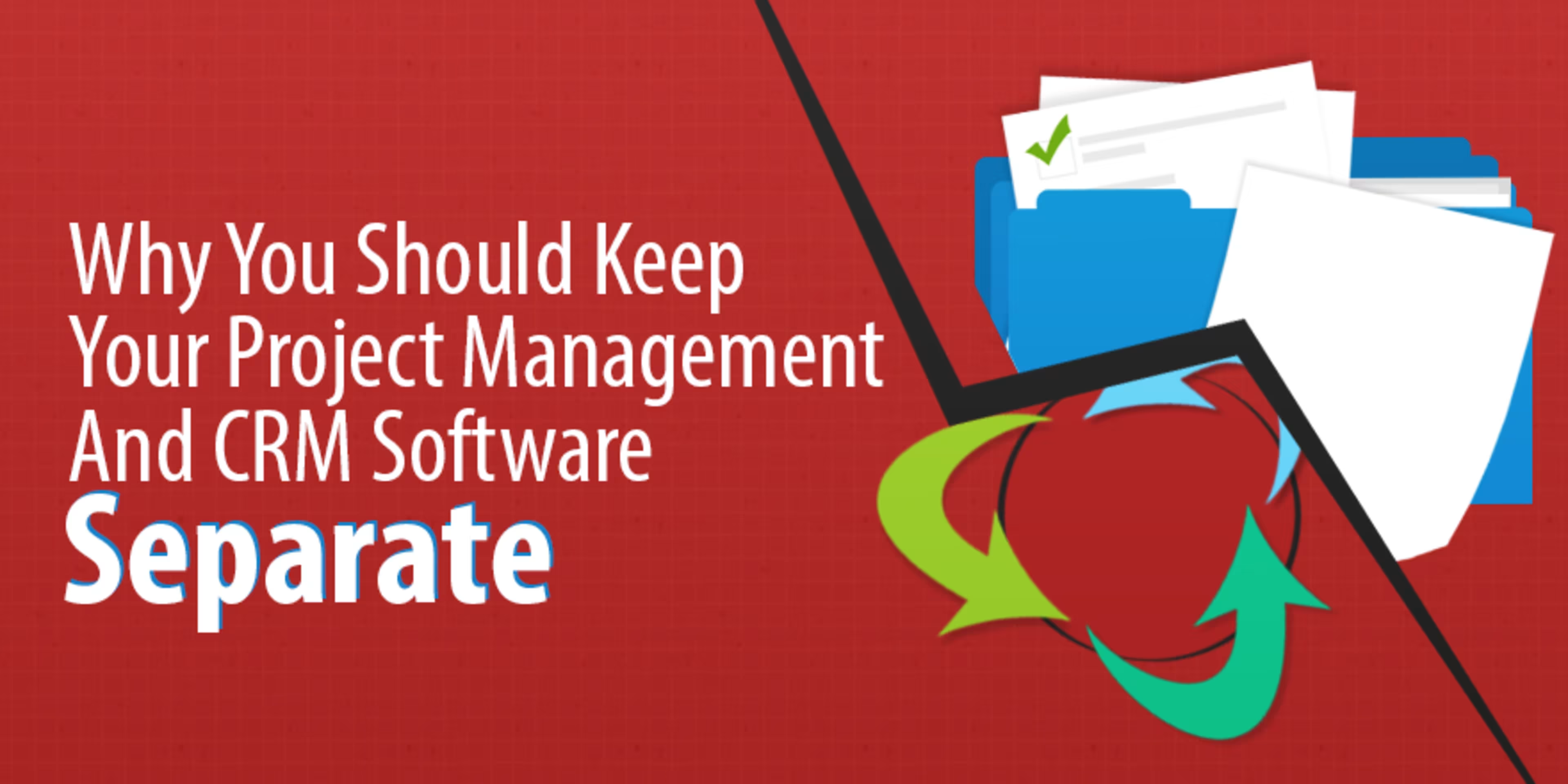It’s the giant elephant in the room when buyers go shopping for project management software and customer relationship management (CRM) software: should you get an all-in-one solution, use plugins, or keep both entities separate?
The question is deceptively complicated. CRM buyers are not typically project management buyers, and vice-versa. Because of that, the existing articles and guides all treat one or the other as simply a feature or add-on for the other. But this isn't accurate.
The reality is that neither industry speaks the other’s language, and, for the most part, project managers and salespeople really should keep their software separate.

What are the similarities between CRM and project management software?
With all that said, there is overlap between the two kinds of software. Across multiple solutions, we found that most (not all) CRMs and project management solutions have the following qualities:
Both tend to have a project management or project planning component.
Both have an email element—whether that be integration or email marketing.
Both contain a scheduling and/or time-tracking tool.
Both tend to have a mobile integration feature.
Both have a system for organizing contacts
In other words, how the software is used tends to be similar—users rely on email, time tracking, and mobile. While neither offers the full functionality of the other, both CRM and PM software tend to offer the basic features of one another.
What are the differences between CRM and project management software?

There are far more differences between CRM software and project management software than similarities because the two software types offer different functions to businesses. CRM software is designed to manage customer data and relationships. It’s a software type that focuses on the business’s external activities.
Project management software is dedicated to projects, or large business goals with clear start and end dates, deliverables, and budget restraints. These projects can either be internal developments (like patching software) or external products (creating a building for a commercial construction company).
The following is mostly CRM-specific functionality:
Customer support
Follow-up tracking
Interaction tracking
Q&A tracking
Quotes and proposal tools
Referral tracking
Sales performance management
Social components
Specified cell-center management feature (as opposed to a general contact management feature, which both solutions often have)
Visitor tracking
The most-popular CRM tools include Salesforce, Zoho, ACT!, and Microsoft Dynamics.
Project management software’s features are a little different. They include:
Advanced collaboration tools
Agile support
Budget management
Gantt charts
Milestone tracking
Portfolio management
Project planning
Task completion tracking
Workflow reports
The most-popular project management software include Microsoft Project, Atlassian, Podio, Wrike, and Basecamp.
Why not buy an all-in-one solution?

1. CRM focuses on the long term; project management works on a by-project basis.
At the end of the day, the end users of CRM software are likely not going to be the same people using project management software (there are, of course, exceptions to this rule, but this is an overarching commonality).
Because customer relationship management software focuses on the long-term success of clients, and project management software focuses on start and end dates, it makes sense to keep these two platforms separate. While businesses may have multiple projects for a singular client, there’s no reason to have all of that customer’s information cluttering the project workstream. A lot of the customer data will be irrelevant to the project itself.
2. All-in-one programs are rare and expensive.
There aren’t many software options that offer both true CRM and project management capabilities. Existing solutions today include JobNimbus and Insightly. But why opt for these programs when you can get free and open source project management and free CRM solutions? Those options are outstanding for small businesses with a tight budget.
What about CRM software options with project management plugins and vice-versa?

A plugin is a compromise and should be dealt with on a company-specific basis. For many companies, they don’t need a robust project management solution, but they do need a task manager to go with their CRM. It makes a lot of sense for a company to invest in a standout CRM system with that plugin feature.
As for project management software, sometimes teams need a very specific type of PM software, like Agile project management software, and only have to manage a few external clients. The opposite would apply to them; get a strong project management system with a CRM plugin.
I reached out to Andy Mahood of Taskfeed, one of Salesforce’s best project management plugins. He also argues that some plugins are just as good as software itself (though I would add that it’s much tougher to demo and find the right software solution with the right plugin on your own!). He disagrees with my conclusions strongly, and not without merit. He writes,
"If you are business who runs client projects then your projects should be linked to, if not inside your CRM. This could be client projects for a marketing agency, professional services business, or post-sales customer onboarding project for a B2B SaaS business, examples are numerous.
When your project management is baked into your CRM you can track leads, manage sales and deliver the project all within the same app. Imagine moving seamlessly from a won deal straight through to delivery of the project within the same system without retyping details. Templates can be defined for repeatable aspects of projects and project dashboards show performance across teams. Your customer projects and tasks will sit alongside your customers, contacts, and deals. This you should realize is no small thing and can in itself deliver substantial competitive advantage. Not only do you increase visibility and communication but you have a single hub for reporting."
Indeed, if you can find veritable plugins that offer robust solutions for your CRM and project management software, run with it.
Just make sure that that’s what you really want.
More?
I’m sure that Andy Mahood isn’t the only person who disagrees with me. Do you think you should keep your CRM and project management software separate? Should you integrate the two? What has your experience been one way or the other?